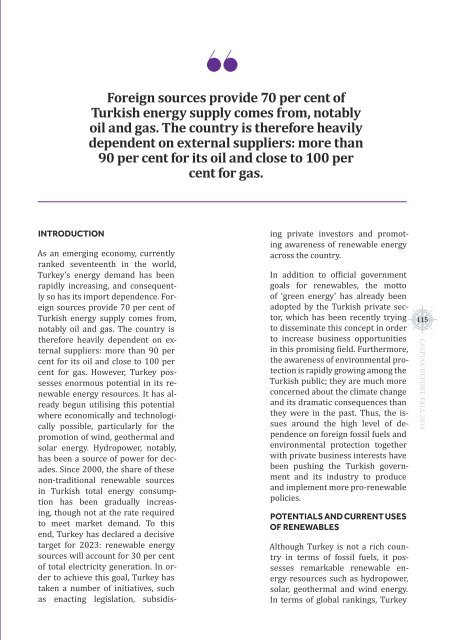Create successful ePaper yourself
Turn your PDF publications into a flip-book with our unique Google optimized e-Paper software.
Foreign sources provide 70 per cent of<br />
Turkish energy supply comes from, notably<br />
oil and gas. The country is therefore heavily<br />
dependent on external suppliers: more than<br />
90 per cent for its oil and close to 100 per<br />
cent for gas.<br />
INTRODUCTION<br />
As an emerging economy, currently<br />
ranked seventeenth in the world,<br />
Turkey’s energy demand has been<br />
rapidly increasing, and consequently<br />
so has its import dependence. Foreign<br />
sources provide 70 per cent of<br />
Turkish energy supply comes from,<br />
notably oil and gas. The country is<br />
therefore heavily dependent on external<br />
suppliers: more than 90 per<br />
cent for its oil and close to 100 per<br />
cent for gas. However, Turkey possesses<br />
enormous potential in its renewable<br />
energy resources. It has already<br />
begun utilising this potential<br />
where economically and technologically<br />
possible, particularly for the<br />
promotion of wind, geothermal and<br />
solar energy. Hydropower, notably,<br />
has been a source of power for decades.<br />
Since 2000, the share of these<br />
non-traditional renewable sources<br />
in Turkish total energy consumption<br />
has been gradually increasing,<br />
though not at the rate required<br />
to meet market demand. To this<br />
end, Turkey has declared a decisive<br />
target for 2023: renewable energy<br />
sources will account for 30 per cent<br />
of total electricity generation. In order<br />
to achieve this goal, Turkey has<br />
taken a number of initiatives, such<br />
as enacting legislation, subsidising<br />
private investors and promoting<br />
awareness of renewable energy<br />
across the country.<br />
In addition to official government<br />
goals for renewables, the motto<br />
of ‘green energy’ has already been<br />
adopted by the Turkish private sector,<br />
which has been recently trying<br />
to disseminate this concept in order<br />
to increase business opportunities<br />
in this promising field. Furthermore,<br />
the awareness of environmental protection<br />
is rapidly growing among the<br />
Turkish public; they are much more<br />
concerned about the climate change<br />
and its dramatic consequences than<br />
they were in the past. Thus, the issues<br />
around the high level of dependence<br />
on foreign fossil fuels and<br />
environmental protection together<br />
with private business interests have<br />
been pushing the Turkish government<br />
and its industry to produce<br />
and implement more pro-renewable<br />
policies.<br />
POTENTIALS AND CURRENT USES<br />
OF RENEWABLES<br />
Although Turkey is not a rich country<br />
in terms of fossil fuels, it possesses<br />
remarkable renewable energy<br />
resources such as hydropower,<br />
solar, geothermal and wind energy.<br />
In terms of global rankings, Turkey<br />
115<br />
CASPIAN REPORT, FALL <strong>2014</strong>










